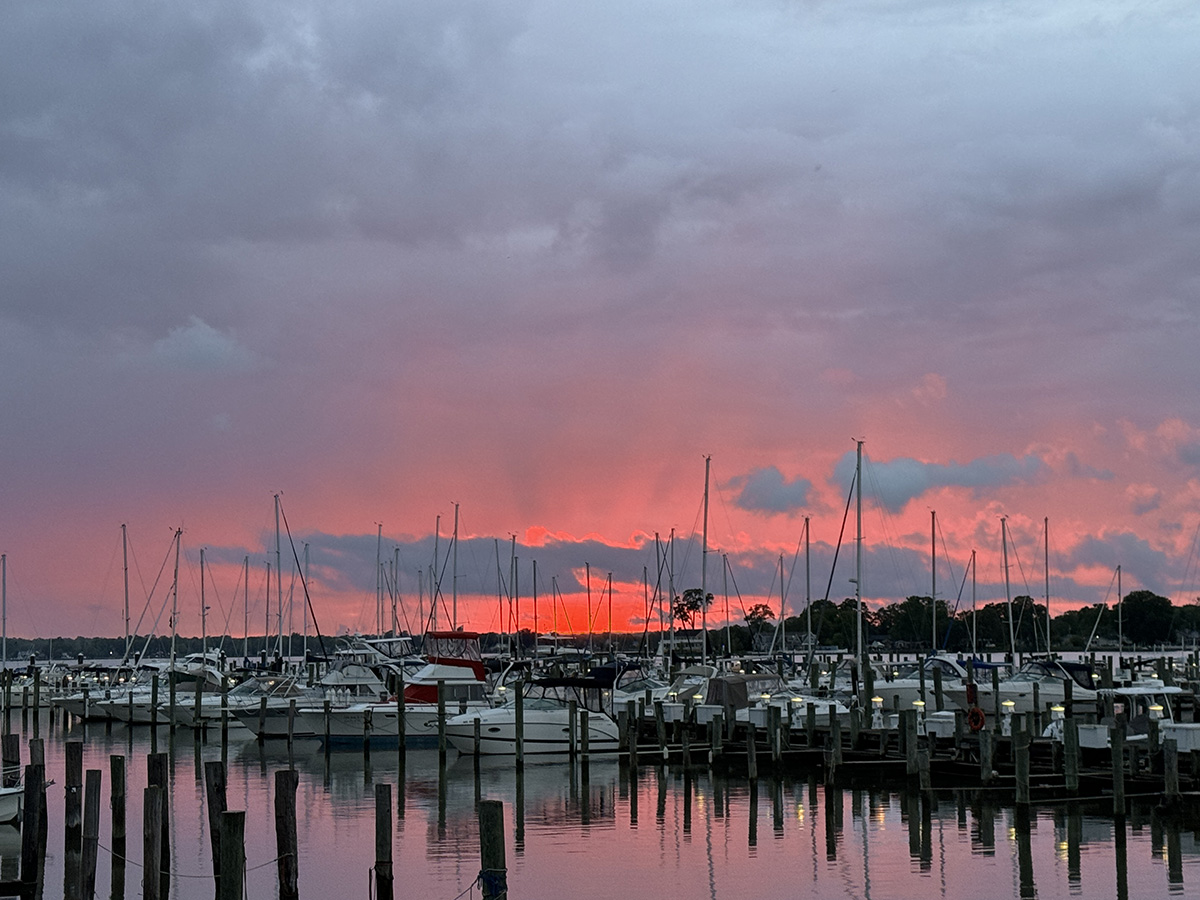
Where your transformative sailing journey beginsTM
Ahoy! February 2025
Maritime Traditions and Superstitions:
The Unwritten Rules of Sailing
Spring is around the corner on the Chesapeake. As soon as the warm weather arrives (and for some old salts, even before), marinas up and down the Bay will be filled with the sounds of sanders removing old bottom paint, tools being dropped as engines are prepared for the season, and, on or around the vernal equinox, a pungent aroma will waft from the firepits.
It's time for Chesapeake Bay sailors to burn their socks.
According to local legend, in 1978 sailor Bob Turner, after a long winter of working in the boatyard, removed his stained and grubby foot coverings, and set them alight in a metal paint pan. As they burned, he cracked open a beer, and vowed that his feet would remain free from the oppression of hosiery until the following autumn. A tradition was born.
Sailing is full of traditions. We’re a superstitious bunch, and when something works - or doesn’t - we try our best to replicate or avoid those circumstances again. Such is the case when your lives and livelihoods are at the mercy of water and wind.
Most people are familiar with the adage "Red sun at night, sailor’s delight; red sun in morning, sailors take warning." This has some meteorological basis. It all has to do with light refraction from the sun's rays, and prevailing weather patterns that move from west to east. The colors are a result of how the light interacts with water vapor and dust when it is passing through the visually thickest part of the atmosphere: near the horizon. A red sky indicates an atmosphere laden with particulates. If this is in the evening, it generally indicates dust in the atmosphere, with more stable air and high pressure moving in. If the red sky appears in the morning, it generally means there is high water content in the air, and a storm could be on the way. Weather forecasting the sailor way, no green screen needed!
Speaking of green… aboard a boat, it is a mixture of luck and omen, depending on the context. A leafy green branch is brought aboard when a boat is christened, symbolizing the wish for her safe return to port at the end of each journey. Conversely, green is discouraged when sailing aboard a boat, as it may encourage her to return to land too soon and bottom out on a shoal.

A 2024 sock burning on the Bay
One of the most deeply rooted superstitions dictates the start of a voyage. It is widely held as unlucky to commence a journey on a Friday. Some believe it is because it is the day Christ was crucified. Others believe it is because the Norse goddess Frigga, for whom Friday is named, was regarded as a witch in early Christianity. Either way, journeys beginning on Friday are believed to invite catastrophe. The U.S. Navy even delayed some vessels from getting underway during World War II if their journey was scheduled to begin on a Friday.
Sailors exercise caution when sailing on a Thursday, as the day is named after Thor, the Norse god of Thunder. Some Mondays are considered ill-advised for sailing, such as the first Monday in April (the day Cain slew Abel), or the second Monday in August (the day Sodom and Gomorrah were destroyed).
So, when does one start a journey? Sundays are considered auspicious because of Christ’s resurrection: "Sunday sail, never fail."
Before setting sail, the boat itself must be prepared. Tradition dictates that a coin be placed under the mast when it is stepped into place. The reasons vary, from wishes for financially profitable voyages, fair winds, and general good luck, to payment to the underworld god for the souls of the crew should the voyage end badly. Gold was preferred, but silver was acceptable, as were foreign coins.
Eating and drinking have their own maritime lore. The first toast must always be cast to the god of the sea. Remain seated when toasting. Never clink glasses; it awakens the souls of dead sailors. And toasting with water is forbidden, asea or on land. At worst, it is believed to lead to death by drowning; at best, seven years of bad sex. Pick your poison.
Superstition prohibits bananas aboard a boat. There may actually be some merit to this one. Aside from the slippery peels, and the potential for lethal snakes or spiders to hide within the banana crates, the ripening fruit releases ethylene gas. This gas triggers other fruits in the vicinity to ripen faster, and could potentially spoil the other produce on a long voyage. Moreover, ethylene gas is highly flammable and reactive; in high concentrations, it can present an explosion hazard. In humans, ethylene gas has been used as a general surgical anesthetic. A sleepy crew is not a safe crew.

Red sky at night as the storms cleared
Animals and sea creatures have their own superstitions. A cat aboard a boat is believed to bring good luck, likely for the practical purpose of killing rats and mice, which eat the stores, chew the lines, and carry diseases. A shark following a ship is considered to portend the imminent death of one of the crew, while dolphins are believed to bring good fortune and guide ships safely through the waters.
Birds are enshrouded in superstition. Albatrosses are believed to carry the souls of dead sailors, and seeing one is considered good luck; however, it is a curse to kill an albatross. If you don't believe me, ask Coleridge's ancient mariner. In Scandinavia, cormorants are believed to be the spirits of loved ones lost at sea, and are thus a good omen. Some sailors tattooed roosters (and pigs) on their feet, believing it would help them return to shore if they fell into the water. Swallows are primarily land-based and thus considered a good omen, a sign that land is not far away. They are also renowned for returning home, and are themselves the inspiration for many maritime tattoos. Seabirds in general, especially storm petrels, are seen as harbingers of incoming heavy weather, and for this reason, sailors are discouraged from killing them.
While underway, superstition mandates caution, or prohibition, of whistling on a boat, as it is a challenge to the wind, which, in response, increases in strength. A brisk breeze is a good thing, but one mustn't "whistle up a storm." This superstition may also stem from practical concerns. Historically, a bosun's whistle was used aboard a boat as a signal to crew; its high pitch could be heard over the sea in bad weather, and a whistling sailor might confuse the message. Whistling was also discouraged aboard because it could be used as a signal for the clandestine intentions of mutineers.
And after being at sea for weeks or months, who wouldn't enjoy a shave, a haircut, or even some neatly trimmed nails? Don't even think about it. Personal grooming while aboard will insult Poseidon, and damn the entire crew.
It is superstition that warns a boat must not be renamed. It is tradition that, should a boat owner feel it absolutely necessary, there must be a process, ceremony, and an offering. That's a blog unto itself.
Sailing season begins May 1st at The Gratitude Sailing Institute. Before you embark, tell those staying on land to wish you "Bon Voyage"; saying "good luck" is bad luck.
And always try to step aboard the boat with your right foot first....
Kiki Mullen is The Gratitude Sailing Institute's webmaster and weathergirl. She keeps a close eye out for anything that would pose a weather safety issue for our students and Captains during the sailing season.
Office@GratitudeSailing.com
(410) 726-4403


